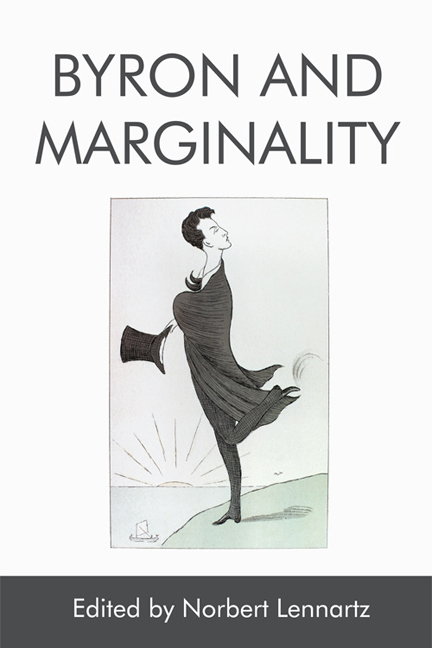Book contents
- Frontmatter
- Contents
- Foreword
- Acknowledgements
- Editions and Abbreviations
- 1 Lord Byron, Wandering and Wavering between the Centres and Margins of Romanticism: An Attempt at an Introduction
- I Byron’s Marginalisation in Romantic World Literature
- II Byron’s Marginal Identities and Places
- III Cherishing the Marginal – Marginal Genres in Byron
- IV On the Provocative Margins of Taste
- V Marginal Affairs – Visual and Paratextual Aspects in Byron
- List of Contributors
- Index
12 - Byron and the Good Death
Published online by Cambridge University Press: 06 May 2021
- Frontmatter
- Contents
- Foreword
- Acknowledgements
- Editions and Abbreviations
- 1 Lord Byron, Wandering and Wavering between the Centres and Margins of Romanticism: An Attempt at an Introduction
- I Byron’s Marginalisation in Romantic World Literature
- II Byron’s Marginal Identities and Places
- III Cherishing the Marginal – Marginal Genres in Byron
- IV On the Provocative Margins of Taste
- V Marginal Affairs – Visual and Paratextual Aspects in Byron
- List of Contributors
- Index
Summary
When Byron's corpse arrived back in England in 1824, immersed in spirits and encased in a double coffin, his long-serving and longsuffering valet Fletcher accompanied it. Fletcher was reunited with his wife, whom he had not seen since 1816, and also with his wife's employer, Lady Byron, who wanted to know about her ex-husband's final hours. In particular, she implored Fletcher to recall his master's last words. But Byron – delirious with fever and weakened by the repeated and misguided bleedings administered by his doctors – did not leave a resonant final statement to posterity. His last words were ‘I want to sleep now.’ Perhaps Lady Byron was moved by what Byron had called ‘the late remorse of love’ (Childe Harold IV, l. 137), but she was also responding to an ideology of the good death that was widely shared by her contemporaries. Several people tried to influence how Byron faced his death, or left accounts of his final hours. James Kennedy sent Byron a tract that recounted Rochester's deathbed conversion. But Julius Millingen recorded, ‘with infinite regret’, that, while he ‘seldom left Lord Byron's pillow during the latter part of his illness, [he] did not hear him make any, even the smallest, mention of religion’. Edward John Trelawny claimed to have written an account of Byron's death, from Fletcher's dictation, resting his paper on Byron's coffin. They all shared Annabella's belief that the final hours were particularly revealing.
Byron repeatedly returned to this idea in his poetry, reflecting and interrogating the Romantic ideology of the good death. This ideology was formed out of both Classical and Christian traditions of thinking about death, which sometimes coexisted uneasily. The Classical tradition emphasised facing one's death with equanimity, surrounded by one's friends. Philosophy would free one from the fear of death, and even allow one to welcome it as the end of earthly ills. In Plato's Phaedo, Socrates approaches his death squarely and rationally, without distress or regret, talking philosophically with his friends to the end. Phaedo reports that ‘the man appeared happy in both manner and words as he died nobly and without fear’.
- Type
- Chapter
- Information
- Byron and Marginality , pp. 233 - 253Publisher: Edinburgh University PressPrint publication year: 2018



